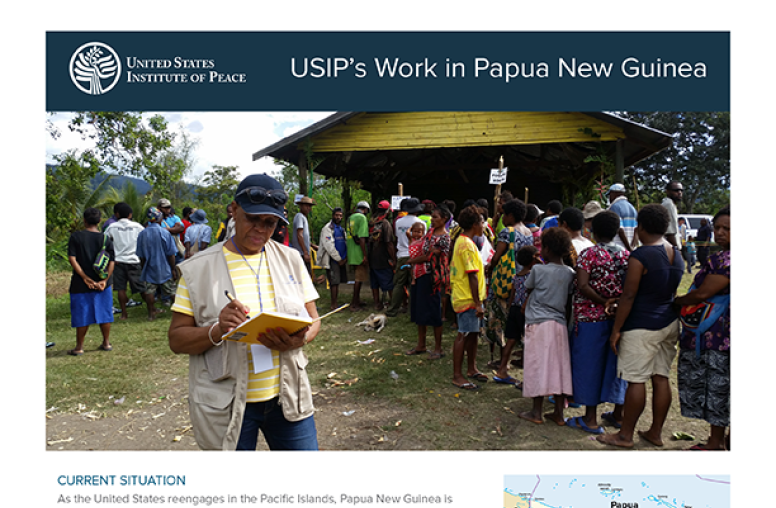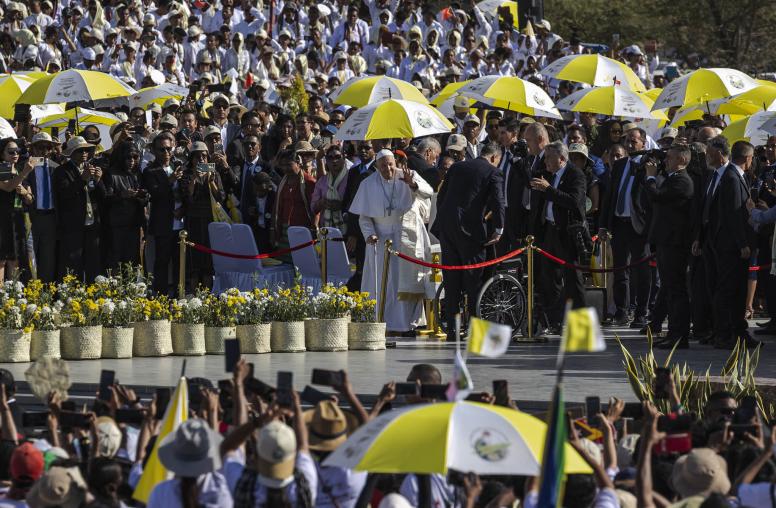A Framework for U.S. Engagement with Papua New Guinea
The United States needs to rethink security cooperation and development assistance.
Papua New Guinea (PNG) has become a key focal point for the United States as it aggressively renews ties with Pacific Island countries. U.S. engagement with PNG will require a comprehensive approach that incorporates cross-nation security cooperation and development assistance. Traditional approaches are insufficient to meet these goals. The United States should envision a framework beyond sole reliance on its military and civilian agencies. This new framework would serve to address PNG’s unique challenges, counter China’s regional activism and undergird U.S. leadership in the Pacific.

The U.S. military and civilian agencies recognize the need for inclusion of creative and dynamic public-private partnerships to successfully enact new security cooperation and development assistance programs. The nongovernmental and private sector’s knowledge, experience and resources must be part of a mechanism to strengthen regional stability.
United States Steps Up
At the annual Asia-Pacific Economic Cooperation meeting in 2018, then U.S. Vice President Mike Pence affirmed that the United States would partner with PNG and Australia on their joint initiative at Lombrum Naval Base on Manus Island. Provincial authorities implored that such base expansion include broader subregional security assistance and economic cooperation to sustain overall development objectives. The initial enthusiasm for this announcement has since been stymied by lackluster follow-through and COVID-19 pandemic complications. The Biden administration’s commitment to “significantly stepping up our game in the Pacific Islands” promises to overcome this setback.
The U.S. commitment is evidenced by a series of bipartisan congressional legislative mandates that call for more active engagement with the Indo-Pacific. U.S. Indo-Pacific Command (USINDOPACOM) regional planning is now defined in Section 1242 of the 2022 National Defense Authorization Act (NDAA) as the Pacific Deterrence Initiative (PDI). The PDI is being aligned with the 2020 Global Fragility Act (GFA). Combined, both pieces of legislation provide critical elements for establishing a strategic framework that strengthens relations between the United States and PNG.
The PDI provides the Department of Defense investments that would strengthen military capabilities across all domains, construct new facilities and build partner country capacity. These initiatives are geared to reassure allies and partners across the region of the depth of U.S. commitment. Most importantly, congressional legislation underpinning this shift in critical military resources will require multibillion-dollar investments over a 20-year period.
The GFA provides an additional $1.15 billion in assistance through 2025 for countries threatened by external conflict and internal violence. Instability resulting from these factors threatens to undermine democratic institutions and thwart economic development. Private sector and nongovernmental organization (NGO) participation to augment civilian agencies is central to successful GFA implementation.
In addition, the Boosting Long-term U.S. Engagement in the Pacific Act, or the BLUE Pacific Act, which has been incorporated in the America Competes Act, calls for civilian agencies “to elevate the countries of Oceania as a strategic national security and economic priority.” Congressional legislation that increases defense spending and civilian agency funding has the potential to accelerate harmonization of regional efforts.
Some Immediate First Steps
The situation in PNG is not subject to regional conflict by state and/or non-state actors. Port Moresby, however, welcomed GFA participation as a means to help thwart the crime, corruption and gang activities that weaken the country. The PNG government also saw the GFA as an opportunity to expand its donor country base and help cement ties to Washington. Moreover, the combined objectives of the PDI and GFA would support improved infrastructure and expedite construction of new base facilities while generating economic growth.
Building a subregional engagement framework anchored in bipartisan congressional authorizations takes time and is fraught with complications. However, there are immediate steps that can be taken using existing resources until other funding comes online. For example, the United States could invest in renewable energies to improve resilience to climate change as part of security cooperation and development assistance. This “greening” also introduces new, more sustainable technologies and provides access to resources needed to build new regional facilities previously unavailable to Pacific Island countries.
Funding labor mobility initiatives would address the immediate need to strengthen port and aviation facilities that would support maritime security operations. Enhancing secondary school and college curricula with communications and computer programming courses will be essential to sustaining connectivity within local economies. In addition, increased vocational training funding would fill gaps in the skilled and semi-skilled local workforce. Focusing on these areas would meet relevant educational needs of Pacific Island countries that are largely dependent upon labor remittances.
Furthermore, increased funding, preparation and training in humanitarian assistance and disaster response programs would significantly improve outcomes when, not if, these regions are affected by natural disasters. PNG has the capacity to be a model for such regional economic development.
Sustainable Planning Is Key to Long-Term Success
Sustainable planning by both donor and recipient countries is essential for realizing long-term success of these programs and should be inclusive of all genders, as put forward in the criteria developed by the National Action Plans on Women, Peace and Security. Moreover, this strategy must incorporate a discernible and perpetual program that addresses the gender-based violence (GBV) undermining PNG’s stability.
Insufficient coordination across the military and development sectors will lead to the continued shortcomings in U.S. engagement with PNG. PNG tribes and urban gangs’ proclivities to use violence for dispute resolution will strain local law enforcement. The situation of stranded refugees and migrants on Manus Island brings additional stresses to local conditions. Unchecked rapid growth has the potential to exacerbate such violence, particularly as it affects women and other vulnerable populations.
The overall impact might be political discord at the national level and discontent within Manus Province. This has the potential to derail goals to reduce violence against women and vulnerable populations. Moreover, it would harken a failure of commitment to relieve harmful domestic issues and send a negative signal throughout the region.
The Need for a Comprehensive Strategy
Although the United States has the appropriate bipartisan congressional backing and a nascent formula for regional architecture, it lacks the interagency and nongovernmental coordination to build the necessary framework to meld national security objectives with human security priorities. A comprehensive strategy to address these concerns requires the United States to change its approach to meeting regional goals.
Increased efforts by regional partners to provide security assistance to PNG will be a factor in maintaining its overall internal stability and mitigating regional instability. U.S. and Australian plans to expand facilities on Manus Island must be accompanied by localized economic development. This includes additional investments in electrification, renewable energy, housing and labor development to support infrastructure expansion and human security needs. These investments are necessary to sustain PNG’s role as a counterweight to China’s foray in the Solomon Islands.
Building the Appropriate Framework for Engagement
To move quickly toward an impactful strategy for the development of Manus Island and other provinces, the United States should envision a framework that coordinates with INDOPACOM beyond sole reliance on its civilian agencies. Consistent with the overall guidelines of the GFA, as well as defined congressional intent, the objectives in PNG must include a framework that creates a different mechanism to achieve progress toward strengthening security cooperation as well as countering domestic instability.
There are many avenues by which to enact positive change as the United States reinvigorates its engagement framework with PNG. However, the United States must move expeditiously to counter regional competition from China and other adversaries. A nongovernmental entity authorized by Washington with oversight by the U.S. Embassy in Port Moresby should be part of a regional engagement framework. This new entity would provide thoughtful guidance and input to military and civilian agencies, including the Department of State, the U.S. Agency for International Development and the U.S. Coast Guard, as well as other civilian agencies.
A nongovernmental entity interfacing with the U.S. Embassy country team would be able to mobilize a broad set of functional capabilities informed by deep regional experience and long-established relationships with partners, allies and stakeholders. This entity would not be encumbered by bureaucratic constraints, administrative restrictions or personnel guidelines that impede agility and flexibility in implementing policies and programs.
Australia already has development programs that would complement a broader enactment of U.S. engagement without distracting from, or overshadowing, current efforts of regional partners. Working with partner countries, the United States would offer a path that meets regional objectives appropriately aligned with indigenous concerns and priorities. Any approach should also lay ground rules for building an attractive framework that supports expanded economic growth and development with clear guideposts and benchmarks for mutually agreed upon deliverables.
Moreover, the nongovernmental entity also would be charged with developing implementation strategies by working directly with the provincial government, donor country and multilateral development organizations, as well as other local NGOs. The engagement model developed through these multilateral forums would serve as the basis for long-term, stable U.S. engagement with PNG. This framework could further be transferred to an emerging independent Bougainville (still covered under the GFA) and even greater Melanesia. This sustained infrastructure also would give the United States a transferable diplomatic methodology and the necessary tools to stand up against competition from China and other regional adversaries.
The United States has the capability to rapidly adjust its diplomatic outreach to incorporate creative and dynamic public-private partnerships. A rethinking of security cooperation and development assistance to PNG is critical to regional success. The nongovernmental and private sector’s knowledge, experience and resources must be brought to bear as the United States searches for a framework to strengthen regional stability and undergird U.S. leadership in the Pacific.
C. Steven McGann is a former U.S. ambassador to the Republics of Fiji, Nauru, Kiribati, and the Kingdom of Tonga and Tuvalu.



